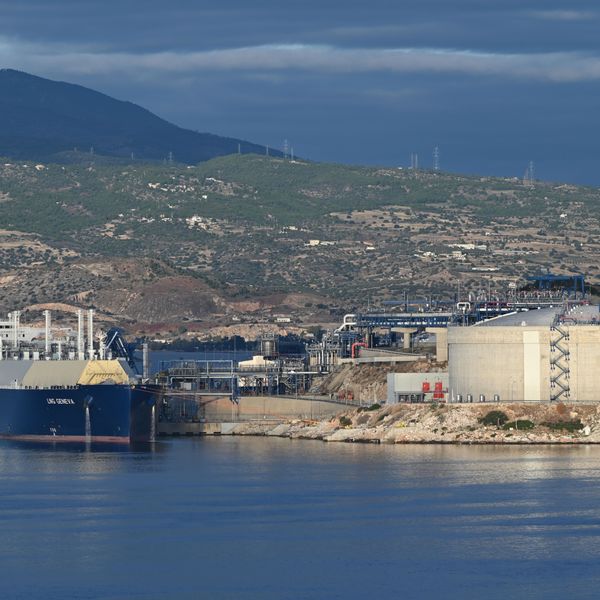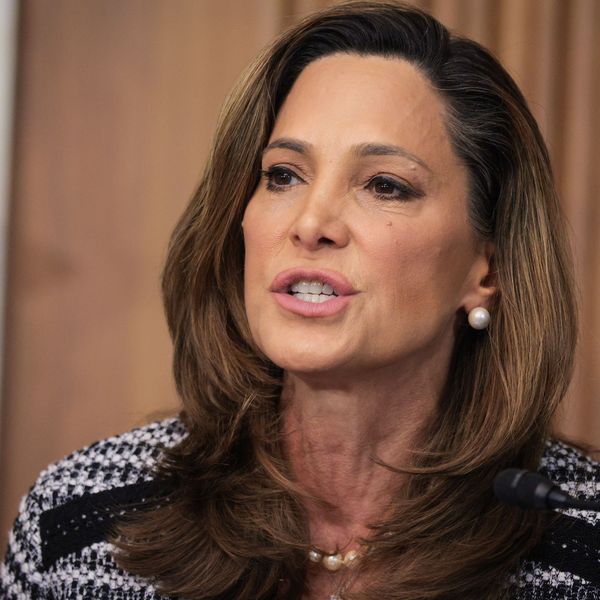Bush Pushes Iraq Oil Law for ExxonMobil
With Iraq going to hell, and the al-Maliki government failing to meet one benchmark after another, Bush is getting desperate.
On Sunday, he sent Admiral Fallon, the chief U.S. commander in the Mideast, to lean on Prime Minister al-Maliki.
On Tuesday, John Negroponte, former U.S. ambassador to Iraq and the UN, flew to Baghdad to lean on al-Maliki.
And what were they leaning on him for, above all?
Passage of the new oil bill, which would turn over Iraqi's liquid treasure to foreign corporations like ExxonMobil.
This is the paramount concern of the Bush Administration.
It is being sold to the American people as a way to equalize revenues to various segments of Iraqi society.
But the true reason for it is to line the pockets of U.S. oil executives.
"The law would transform Iraq's oil industry from a nationalized model closed to American oil companies except for limited (although highly lucrative) marketing contracts into a commercial industry, all-but-privatized, that is fully open to all international oil companies," Antonia Juhasz, author of "The Bush Agenda," wrote in an op-ed for The New York Times on March 13.
"The Iraq National Oil Company would have exclusive control of just 17 of Iraq's 80 known oil fields, leaving two-thirds of known--and all of its as yet undiscovered--fields open to foreign control," Juhasz wrote. "The foreign companies would not have to invest their earnings in the Iraqi economy, partner with Iraqi companies, hire Iraqi workers or share new technologies. . . The international oil companies could also be offered some of the most corporate-friendly contracts in the world."
Not surprisingly, the Iraqi people don't want their oil privatized. They've been resisting this move in parliament, and in the streets.
Iraq's oil unions have been leading this resistance movement, holding demonstrations and waging strikes, as recently as June 4 in Basra.
So bothered by this is the Bush Administration that it ordered U.S. fighter jets to circle over and buzz the demonstrators, according to labor journalist David Bacon.
Bush is at least consistent, though.
He's still working for the oil industry, and he's anti-union here, and he's anti-union there.
Matthew Rothschild is the editor of The Progressive magazine.
(c) 2007 The Progressive
An Urgent Message From Our Co-Founder
Dear Common Dreams reader, The U.S. is on a fast track to authoritarianism like nothing I've ever seen. Meanwhile, corporate news outlets are utterly capitulating to Trump, twisting their coverage to avoid drawing his ire while lining up to stuff cash in his pockets. That's why I believe that Common Dreams is doing the best and most consequential reporting that we've ever done. Our small but mighty team is a progressive reporting powerhouse, covering the news every day that the corporate media never will. Our mission has always been simple: To inform. To inspire. And to ignite change for the common good. Now here's the key piece that I want all our readers to understand: None of this would be possible without your financial support. That's not just some fundraising cliche. It's the absolute and literal truth. We don't accept corporate advertising and never will. We don't have a paywall because we don't think people should be blocked from critical news based on their ability to pay. Everything we do is funded by the donations of readers like you. Will you donate now to help power the nonprofit, independent reporting of Common Dreams? Thank you for being a vital member of our community. Together, we can keep independent journalism alive when it’s needed most. - Craig Brown, Co-founder |
With Iraq going to hell, and the al-Maliki government failing to meet one benchmark after another, Bush is getting desperate.
On Sunday, he sent Admiral Fallon, the chief U.S. commander in the Mideast, to lean on Prime Minister al-Maliki.
On Tuesday, John Negroponte, former U.S. ambassador to Iraq and the UN, flew to Baghdad to lean on al-Maliki.
And what were they leaning on him for, above all?
Passage of the new oil bill, which would turn over Iraqi's liquid treasure to foreign corporations like ExxonMobil.
This is the paramount concern of the Bush Administration.
It is being sold to the American people as a way to equalize revenues to various segments of Iraqi society.
But the true reason for it is to line the pockets of U.S. oil executives.
"The law would transform Iraq's oil industry from a nationalized model closed to American oil companies except for limited (although highly lucrative) marketing contracts into a commercial industry, all-but-privatized, that is fully open to all international oil companies," Antonia Juhasz, author of "The Bush Agenda," wrote in an op-ed for The New York Times on March 13.
"The Iraq National Oil Company would have exclusive control of just 17 of Iraq's 80 known oil fields, leaving two-thirds of known--and all of its as yet undiscovered--fields open to foreign control," Juhasz wrote. "The foreign companies would not have to invest their earnings in the Iraqi economy, partner with Iraqi companies, hire Iraqi workers or share new technologies. . . The international oil companies could also be offered some of the most corporate-friendly contracts in the world."
Not surprisingly, the Iraqi people don't want their oil privatized. They've been resisting this move in parliament, and in the streets.
Iraq's oil unions have been leading this resistance movement, holding demonstrations and waging strikes, as recently as June 4 in Basra.
So bothered by this is the Bush Administration that it ordered U.S. fighter jets to circle over and buzz the demonstrators, according to labor journalist David Bacon.
Bush is at least consistent, though.
He's still working for the oil industry, and he's anti-union here, and he's anti-union there.
Matthew Rothschild is the editor of The Progressive magazine.
(c) 2007 The Progressive
With Iraq going to hell, and the al-Maliki government failing to meet one benchmark after another, Bush is getting desperate.
On Sunday, he sent Admiral Fallon, the chief U.S. commander in the Mideast, to lean on Prime Minister al-Maliki.
On Tuesday, John Negroponte, former U.S. ambassador to Iraq and the UN, flew to Baghdad to lean on al-Maliki.
And what were they leaning on him for, above all?
Passage of the new oil bill, which would turn over Iraqi's liquid treasure to foreign corporations like ExxonMobil.
This is the paramount concern of the Bush Administration.
It is being sold to the American people as a way to equalize revenues to various segments of Iraqi society.
But the true reason for it is to line the pockets of U.S. oil executives.
"The law would transform Iraq's oil industry from a nationalized model closed to American oil companies except for limited (although highly lucrative) marketing contracts into a commercial industry, all-but-privatized, that is fully open to all international oil companies," Antonia Juhasz, author of "The Bush Agenda," wrote in an op-ed for The New York Times on March 13.
"The Iraq National Oil Company would have exclusive control of just 17 of Iraq's 80 known oil fields, leaving two-thirds of known--and all of its as yet undiscovered--fields open to foreign control," Juhasz wrote. "The foreign companies would not have to invest their earnings in the Iraqi economy, partner with Iraqi companies, hire Iraqi workers or share new technologies. . . The international oil companies could also be offered some of the most corporate-friendly contracts in the world."
Not surprisingly, the Iraqi people don't want their oil privatized. They've been resisting this move in parliament, and in the streets.
Iraq's oil unions have been leading this resistance movement, holding demonstrations and waging strikes, as recently as June 4 in Basra.
So bothered by this is the Bush Administration that it ordered U.S. fighter jets to circle over and buzz the demonstrators, according to labor journalist David Bacon.
Bush is at least consistent, though.
He's still working for the oil industry, and he's anti-union here, and he's anti-union there.
Matthew Rothschild is the editor of The Progressive magazine.
(c) 2007 The Progressive

